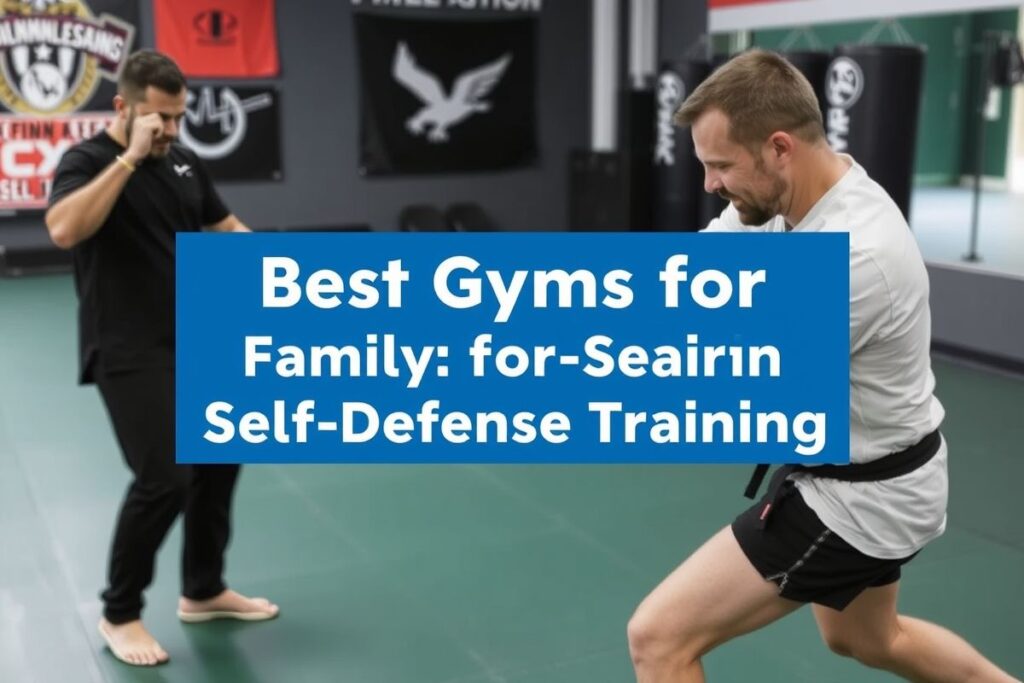Best Gyms for Family Self-Defense Training – 10 Suggestions

In today’s world, ensuring the safety and security of your family is paramount. While we hope to never face threatening situations, equipping ourselves with practical self-defense skills can provide invaluable peace of mind. Family self-defense training goes beyond just physical techniques; it fosters confidence, improves situational awareness, and strengthens family bonds through shared learning. Finding the right gym for this training, however, can be a challenge. This article highlights ten excellent options, focusing on programs that cater to families and offer a comprehensive approach to self-defense.
Choosing the Right Self-Defense Gym for Your Family
Curriculum and Instructors
A comprehensive curriculum is key. Look for programs that incorporate a blend of martial arts styles like Krav Maga, Brazilian Jiu-Jitsu, or Judo, adapted for family learning. Experienced instructors are crucial. They should be certified, patient, and skilled in teaching diverse age groups and fitness levels. A good instructor will create a supportive and encouraging environment for all family members.
Beyond physical techniques, a good self-defense program should also address situational awareness, de-escalation tactics, and strategies for avoiding potentially dangerous situations. These essential skills empower families to proactively manage risks and make informed decisions in challenging circumstances.
Consider the instructor’s background and teaching philosophy. Look for instructors who emphasize practical application, realistic scenarios, and a holistic approach to self-defense that encompasses physical, mental, and emotional preparedness.
Facility and Atmosphere
A clean, well-maintained facility with appropriate safety equipment is essential for a positive training experience. The gym’s atmosphere should be welcoming and inclusive for families, fostering a sense of community and mutual support. A positive and encouraging environment can significantly enhance motivation and learning.
The gym should be conveniently located and offer flexible scheduling options to accommodate busy family schedules. Consider factors such as proximity to home or work, class times, and the availability of weekend or evening sessions.
Observe a class or two before committing to a program. This allows you to assess the teaching style, the gym’s atmosphere, and whether it’s a good fit for your family’s needs and dynamics.
Cost and Schedule
Compare pricing structures and membership options to find a program that fits your budget. Many gyms offer family discounts or package deals. Consider the long-term commitment required and the value offered in terms of instruction, facilities, and training frequency.
Flexible scheduling is crucial for families. Look for gyms that offer a variety of class times to accommodate varying work and school schedules. The availability of weekend or evening classes can be particularly beneficial for busy families.
Inquire about trial periods or introductory offers. This allows you to experience the program firsthand before making a financial commitment and ensures it’s a good fit for your family.
Top 10 Family Self-Defense Gyms (Examples)
Regional and National Chains
Some national and regional gym chains offer specialized family self-defense programs. These can be a convenient option with standardized curricula and experienced instructors. However, it’s essential to research specific locations and instructors to ensure quality and a family-friendly environment.
Local martial arts studios often offer family classes and provide a more personalized approach to training. These smaller studios can foster a strong sense of community and offer individualized attention.
Community centers and recreational facilities may also offer affordable self-defense programs suitable for families. These programs can be a great way to introduce families to self-defense basics in a low-pressure environment.
Local Martial Arts Studios
Smaller, locally-owned martial arts studios often offer a more personalized learning experience. The close-knit environment can be particularly beneficial for families, fostering a sense of community and support.
These studios often specialize in specific martial arts styles, allowing families to delve deeper into a particular discipline and develop specialized skills.
Research local studios and inquire about their experience with families and children. Look for studios that prioritize safety, respect, and a positive learning environment.
Community Centers and Recreation Programs
Community centers and recreation programs often provide affordable self-defense classes accessible to a wider range of families. These programs may offer a more introductory approach to self-defense, suitable for beginners and families with younger children.
Check with your local community center or parks and recreation department for available programs and schedules. These programs can be a great way to introduce families to the benefits of self-defense training in a cost-effective manner.
While these programs may not offer the same level of specialization as dedicated martial arts studios, they can provide valuable foundational skills and a positive introduction to self-defense principles.
Finding the Right Fit for Your Family
Ultimately, the best gym for family self-defense training depends on your specific needs, preferences, and family dynamics. Consider factors such as the age and fitness levels of family members, preferred learning styles, and budget constraints. Visiting different gyms, observing classes, and speaking with instructors is crucial for making an informed decision. Family self-defense training is an investment in your family’s safety and well-being, empowering everyone with valuable skills and confidence.
| Gym Type | Pros | Cons |
|---|---|---|
| National Chains | Standardized Curriculum, Multiple Locations | May Lack Personalization |
| Local Studios | Personalized Attention, Community Focus | May Be More Expensive |
| Community Centers | Affordable, Accessible | May Be Introductory Level |
- Research different gyms and programs.
- Observe classes and meet instructors.
- Consider your family’s needs and preferences.
